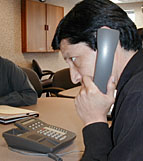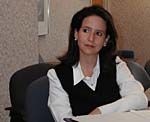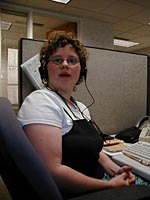By Jeff Horwich
Minnesota Public Radio
November 26, 2001
|
| RealAudio |
Learning to work in Spanish is a matter of necessity for more and more Minnesota businesses. Many meat processing plants, for example, have seen the Hispanic portion of their work force grow to one-quarter, one-half, or more. For other companies, embracing Spanish is a business decision. Fingerhut is one large company in Minnesota finding bilingual workers are good for the bottom line.
| |
|
|
|
||
Noel Salazar is a musician and photographer from Bolivia. He speaks Spanish, Italian, Portuguese and French. For years he traveled the world playing South American music.
But for the moment he's found a home in Brooklyn Center. He works in a call center for Fingerhut. From here he talks with some of Fingerhut's most important customers -- in places like Florida, Texas, and California.
"For them it's good to have someone working in their language, you know? Because it's kind of hard to learn English," Salazar said. "They can better understand the information, they are going to buy more products, and they are for sure more happy to be working in their language."
Martha Kruse, from Peru, is a manager in Fingerhut's two-year-old Hispanic marketing department. She calls Hispanics the "sweet spot" among Fingerhut's customers.
| |
|
|
|
||
"I think in 1991 they started to call us in Spanish and nobody knew what to do with these customers," she said. "So it was kind of a growing, natural process, and I think now with the boom it's growing really fast for Fingerhut."
In the first half of this year, overall Fingerhut catalog sales were off 40% from the year before. Spanish-language orders took a dip as well, but have remained relatively strong. Seventeen percent of Fingerhut sales now go to the company's 1.6 million Hispanic customers.
"The Hispanic market is still very strong, still growing fast," Kruse said. "Every month when I do what we call 'the scorecard,' every month we get new customers. And the most important thing: They stay for a while."
| |
|
|
|
||
For 50 years, Fingerhut has established a successful niche by marketing to middle and lower income people. Kruse says this experience gives them an advantage in the Hispanic market. They've entered into a special agreement with Univision, the largest Spanish-language cable network in the U.S., and they'd like to expand their business south of the border.
"Hispanics are very, very loyal," Kruse said. "And we tell our friends, kind of like word-of-mouth."
Bilingual customer service reps like Noel Salazar say telemarketing is more pleasant work when a Latino is on the other end of the line.
"Latino-American culture is very different," Salazar said. "It's maybe more friendly, that's my view. It's more friendly, and you can talk easier with them. Because American people are much more busy. They want to go right to the point; time is money."
| |
|
|
|
||
Fingerhut has 22 bilingual call-center workers in Brooklyn Center and another 44 in St. Cloud. Call-centers in Tennessee and Arizona also have Spanish-speaking representatives, and the company recently began outsourcing call center work to a facility in Puerto Rico that has 130 bilingual employees.
Fingerhut plans to expand all of those facilities. Puerto Rico is attractive for obvious reasons, but even here in Brooklyn Center they've had no trouble assembling a crew from Mexico, Nicaragua, Bolivia, Chile, Peru and Colombia, where Maria Lopez grew up.
Lopez says they've all had some work to do to learn a standard Spanish vocabulary.
"I call a customer to make a sale. She says 'I can't buy right now because I've got 'endrogada.' And 'endrogada,' for me, you know, means 'I got drugs.' And I thought, 'oh, my god, what this lady say?' Because in Columbia it's a very strong word, you know."
| |
|
|
|
||
For the woman at the other end of the phone, this was everyday slang that meant she didn't have the money.
Lopez calls herself 85 percent bilingual. The other Hispanic call center workers are also well-educated and fluent in both languages. They say the jobs are stable, have flexible hours, and pay a livable wage.
Martha Kruse brought an MBA to her job with the Hispanic marketing division. She says if Spanish-speakers hone their language skills, they may find a job that pays a better wage.
"Well, it's hard. Language is really difficult," Kruse said. "And also when you learn the language and you have to communicate on a business level, you have to be very good. Depends on the job you do, but there is a certain expectation."
As for Noel Salazar, he hopes to return to a music career before long. In the meantime, he says he's glad to have a job here, where his other skills are in demand.
More from MPR




